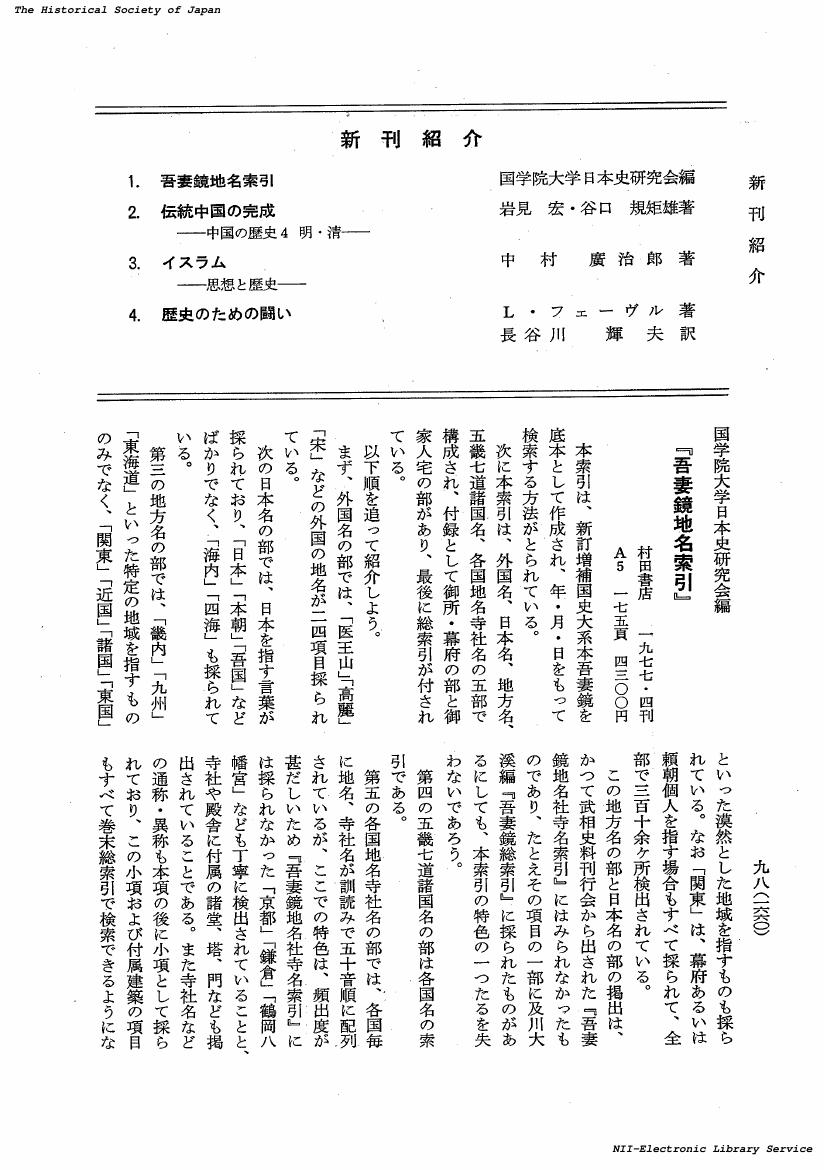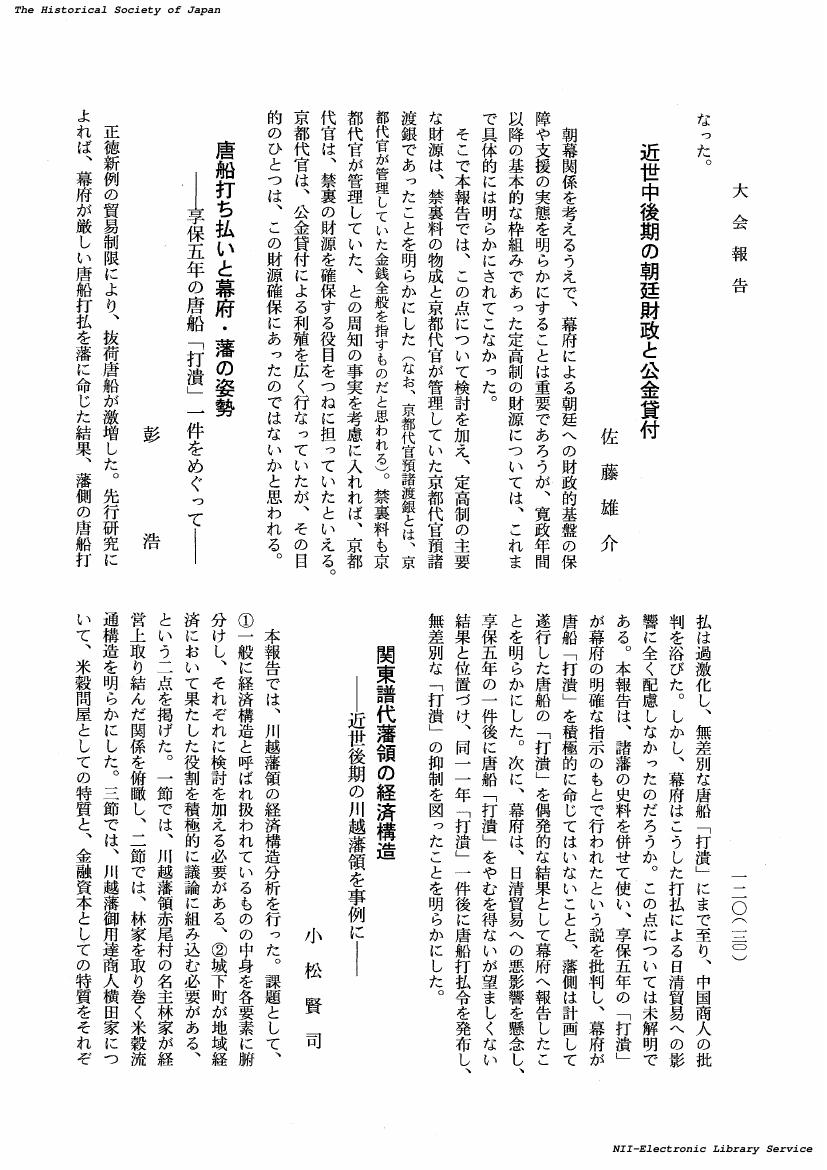- 著者
- 山本 博也
- 出版者
- 公益財団法人 史学会
- 雑誌
- 史学雑誌 (ISSN:00182478)
- 巻号頁・発行日
- vol.86, no.11, pp.1660-1661, 1977-11-20 (Released:2017-10-05)
- 著者
- 山名 弘史
- 出版者
- 公益財団法人 史学会
- 雑誌
- 史学雑誌 (ISSN:00182478)
- 巻号頁・発行日
- vol.86, no.11, pp.1661-1662, 1977-11-20 (Released:2017-10-05)
- 著者
- 安藤 正人
- 出版者
- 公益財団法人 史学会
- 雑誌
- 史学雑誌 (ISSN:00182478)
- 巻号頁・発行日
- vol.86, no.10, pp.1533-1534, 1977-10-20 (Released:2017-10-05)
1 0 0 0 OA 後藤 靖編『天皇制と民衆』, 東大出版会, 一九七六・一〇刊, 四六判, 二〇七頁
- 著者
- 宮地 正人
- 出版者
- 公益財団法人 史学会
- 雑誌
- 史学雑誌 (ISSN:00182478)
- 巻号頁・発行日
- vol.86, no.10, pp.1534-1535, 1977-10-20 (Released:2017-10-05)
1 0 0 0 OA 矢島祐利著『アラビア科学史序説』, 岩波書店, 一九七七・三刊, B6, 四四五頁
- 著者
- 田中 一郎
- 出版者
- 公益財団法人 史学会
- 雑誌
- 史学雑誌 (ISSN:00182478)
- 巻号頁・発行日
- vol.86, no.10, pp.1536, 1977-10-20 (Released:2017-10-05)
- 著者
- 石田 智子
- 出版者
- 公益財団法人 史学会
- 雑誌
- 史学雑誌 (ISSN:00182478)
- 巻号頁・発行日
- vol.85, no.2, pp.222-223, 1976-02-20 (Released:2017-10-05)
- 著者
- 中見 立夫
- 出版者
- 公益財団法人 史学会
- 雑誌
- 史学雑誌 (ISSN:00182478)
- 巻号頁・発行日
- vol.85, no.8, pp.1177-1194, 1976-08-20 (Released:2017-10-05)
1 0 0 0 OA ヨーロッパ : 近代 : ドイツ(一九七五年の歴史学界 : 回顧と展望)
- 著者
- 増谷 英樹
- 出版者
- 公益財団法人 史学会
- 雑誌
- 史学雑誌 (ISSN:00182478)
- 巻号頁・発行日
- vol.85, no.5, pp.828-832, 1976-05-20 (Released:2017-10-05)
1 0 0 0 OA ドイツ史学の過去と現在
- 著者
- 西村 貞二
- 出版者
- 公益財団法人 史学会
- 雑誌
- 史学雑誌 (ISSN:00182478)
- 巻号頁・発行日
- vol.85, no.7, pp.1067-1080, 1976-07-20 (Released:2017-10-05)
1 0 0 0 OA ヨーロッパ : 現代 : ドイツ(一九七五年の歴史学界 : 回顧と展望)
- 著者
- 木村 靖二
- 出版者
- 公益財団法人 史学会
- 雑誌
- 史学雑誌 (ISSN:00182478)
- 巻号頁・発行日
- vol.85, no.5, pp.843-846, 1976-05-20 (Released:2017-10-05)
1 0 0 0 摂関期における左右近衛府の内裏夜行と宿直:夜間警備と貴族認識
- 著者
- 鈴木 裕之
- 出版者
- 公益財団法人 史学会
- 雑誌
- 史学雑誌 (ISSN:00182478)
- 巻号頁・発行日
- vol.125, no.6, pp.37-62, 2016
本稿の目的は、内裏の夜間警備(夜行・宿直)の分析から、摂関期における左右近衛府の機能を検討することである。律令制以来、衛府は内裏警備を主たる職掌とした。夜間の警備も同じく規定されていた。延喜式段階でも、その職掌は継承された。本稿の問題意識は、このような内裏の夜間警備が摂関期(一一世紀)に機能していたか、あるいは貴族に認識されていたかという点にある。従来の研究で否定的に理解されてきた摂関期の左右近衛府の治安維持機能について、内裏夜行・宿直の観点から再検討した。<br>まず、延喜式の夜行・宿衛規定の分析を起点とした。夜行に関する諸規定から、六衛府すべてが内裏・大内裏の夜行に関与していることを指摘した。内裏夜行の検討が、摂関期の左右近衛府の性格を知るうえで有効であると判断した。また、宿衛は考第・昇進の条件として考えられていた。内裏夜行・宿衛の実態史料の分析から、その日常性が確認できた。<br>次に、一一世紀の左右近衛府の内裏夜行・宿直を考えるため、行事書・儀式書から次第を確認し、古記録から実態を検討した。その結果、摂関期における左右近衛府の内裏夜行・宿直の日常性が明らかとなり、貴族が治安維持組織たる左右近衛府を認識していたことを指摘した。<br>最後に、内裏夜行・宿直の有効性を補足する論点として、内裏火災における左右近衛府の活動に着目した。摂関期の内裏火災において、消火活動と予防組織としての左右近衛府の姿がみられた。消火・予防という活動の背景には、内裏夜行・宿直の有効性とそれに付随する貴族認識があると考えた。<br>従来の研究で否定的に理解されてきた左右近衛府の治安維持機能を、内裏の夜間警備を通じてみることで、肯定的に捉えようとしたのが本稿である。儀式関与・芸能・摂関家への奉仕など、様々な存在形態が認められる左右近衛府であるが、本来的な治安維持組織としての姿もその一つとして認めるべきであると結論づけた。
- 著者
- 佐藤 雄介
- 出版者
- 公益財団法人 史学会
- 雑誌
- 史学雑誌 (ISSN:00182478)
- 巻号頁・発行日
- vol.118, no.1, pp.120, 2009-01-20 (Released:2017-12-01)
1 0 0 0 欧米諸国における大正・昭和史研究の近況
- 著者
- ゴードン バーガー M. 渡辺 昭夫 訳
- 出版者
- 公益財団法人 史学会
- 雑誌
- 史学雑誌 (ISSN:00182478)
- 巻号頁・発行日
- vol.87, no.3, pp.346-364, 1978
1 0 0 0 OA イメージの史料性(コラム 歴史の風)
- 著者
- 有馬 学
- 出版者
- 公益財団法人 史学会
- 雑誌
- 史学雑誌 (ISSN:00182478)
- 巻号頁・発行日
- vol.119, no.3, pp.325-327, 2010-03-20 (Released:2017-12-01)
1 0 0 0 OA 「東京裁判史観」を想う(コラム 歴史の風)
- 著者
- 伊藤 隆
- 出版者
- 公益財団法人 史学会
- 雑誌
- 史学雑誌 (ISSN:00182478)
- 巻号頁・発行日
- vol.122, no.2, pp.185-187, 2013-02-20 (Released:2017-12-01)
1 0 0 0 OA 藤木久志著『戦国大名の権力構造』
- 著者
- 池 享
- 出版者
- 公益財団法人 史学会
- 雑誌
- 史学雑誌 (ISSN:00182478)
- 巻号頁・発行日
- vol.97, no.4, pp.479-491, 1988-04-20 (Released:2017-11-29)
1 0 0 0 伏見宮貞成親王の尊号宣下:後光厳院流皇統と崇光院流皇統の融和
- 著者
- 田村 航
- 出版者
- 公益財団法人 史学会
- 雑誌
- 史学雑誌 (ISSN:00182478)
- 巻号頁・発行日
- vol.127, no.11, pp.1-23, 2018
後花園天皇は崇光院流皇統(伏見宮)の出身ながら、断絶した後光厳院流皇統を猶子相続したため、どちらの皇統の継承者なのかという点で見解が分かれている。この問題を解明するにあたり、鍵となる伏見宮貞成親王(後崇光院)の尊号宣下についても、後花園と貞成の続柄や、貞成の尊号辞退をめぐり、検討する余地が残されている。そこで本稿では同時期の政治状況を見据えつつ、これらの問題をあきらかにしていきたい。<br>永享五年(一四三三)、後花園は義父の後小松院が死没したさいに後光厳院流の継承者と再確認されたものの、生家の崇光院流との関係を絶ち切れず、文安四年(一四四七)の貞成親王の尊号宣下を「厳親」としておこなうのか、それとも「傍親」としておこなうのかが問題となった。結局、後花園は貞成の尊号宣下を「傍親」すなわち兄としておこない、自らが後光厳院流の継承者であることを明示した。これは康正二年(一四五六)の貞成の葬礼でも変わらなかったので、貞成の尊号宣下は後花園の皇統を決した節目と見なせる。また貞成は尊号辞退の報書を提出し、とくに慰留された形跡はないが、依然上皇として天皇・室町殿と並びたつ位地にあった。<br>このように後光厳院流の後花園天皇と崇光院流の上皇の貞成が並存する、一見矛盾した措置がとられたのは、後花園の実父として貞成への尊号宣下をしてはならないという後小松院の遺詔と、足利義教が貞成を後花園の実父と遇してきた政治路線との妥結による。この結果、伏見宮は当主が代々後光厳院流の天皇の猶子として親王位につきつつ、崇光院流の上皇たる貞成にもつらなる世襲親王家として皇位継承権を担保され、後花園は後光厳院流の系譜上の断絶を回避しつつ、崇光院流(伏見宮)の温存をも果たし、前世紀以来の両皇統の争いを終息させ、その融和と両立を実現させたのである。
1 0 0 0 第一次大戦期の河上清の活動 : 外務省の対米世論工作
- 著者
- 石井 裕
- 出版者
- 公益財団法人 史学会
- 雑誌
- 史学雑誌 (ISSN:00182478)
- 巻号頁・発行日
- vol.114, no.6, pp.1071-1096, 2005
When the Alien Land Law prohibiting land ownership by aliens not eligible for citizenship (mainly Asians) was passed in the California Assembly in May 1913, Japanese officials and immigrants alike realized the merit of swaying US public opinion. To quell the rising anti-Japanese movement, the Japanese Foreign Ministry set up in 1914 two publicity bureaus-the Pacific Press Bureau (PPB) in San Francisco and the East and West News Bureau (EWNB) in New York City-disguising both as private "press agencies". Kiyoshi Kawakami, who had been invited to San Francisco by the Japanese Association as manager of the Campaign of Education, was appointed chief of PPB, a low cost operation designed to placate the local California press and contribute news items to influential papers throughout the country. The Japanese consul-general, who held the ultimate responsibility for PPB, was pleased with Kawakami's capability as a propagandist. At the onset, PPB activities were hindered due to poor cablegram communications with Tokyo; however, on the occasion of the declaration of war on Germany, the Japanese Foreign Minister took a more positive attitude and imposed upon PPB the role of an agency for war propaganda. Therefore, Kawakami came to play a dual role as a promoter of Japanese military policy in the Far East and debunker of prevalent anti-Japanese public opinion, especially the rumors of a pending US-Japanese war being spread by propagandists for the German and Chinese governments. Kawakami was also involved in intelligence work, obtaining confidential State Assembly documents for the Japanese Consulate and lobbying against anti-Japanese bills introduced during the Assembly's 42nd Session. After the war, PPB was forced to tone down its blatant propaganda due to public antipathy towards such activity on the part of Japanese and pro-Japanese Americans, conflict within the Bureau between Japanese and American staff members, and a threat that Kawakami's secret arrangements with the Japanese government would be become public. From 1917 one, Kawakami was frequently absent from his San Francisco headquarters, travelling to the Far East, New York and Washington DC courtesy of the Japanese Foreign Ministry. Kawakami was expected of wide-ranging activities as a Ministry intelligence agent, not merely a kind of propagandist in San Francisco. Both PPB and EWNB were shut down because of the establishment in August 1921 of the Foreign Ministry's Intelligence Office which changed the tone of its information policy from "active" and "wartime" to "moderate" and "peaceful". Kawakami left San Francisco for Washington DC in January 1923, where he continued to maintain secret connections to the Japanese Embassy.
1 0 0 0 本会顧問大類伸先生を偲ぶ
- 著者
- 西村 貞二
- 出版者
- 公益財団法人 史学会
- 雑誌
- 史学雑誌 (ISSN:00182478)
- 巻号頁・発行日
- vol.85, no.3, pp.348-349, 1976
- 著者
- 角谷 英則
- 出版者
- 公益財団法人 史学会
- 雑誌
- 史学雑誌 (ISSN:00182478)
- 巻号頁・発行日
- vol.108, no.2, pp.250-258, 1999













